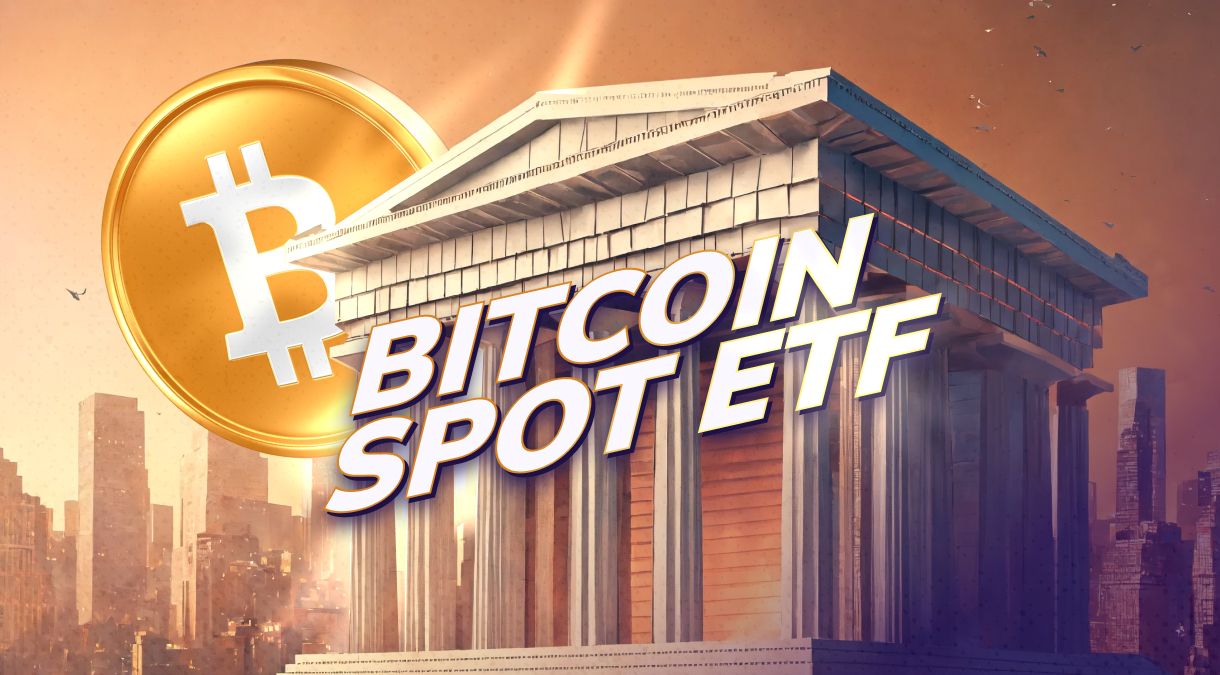
Poised to change the game for investors worldwide, Bitcoin Spot Exchange-Traded Funds (ETFs) are making waves, offering a regulated gateway to the world of Bitcoin. In this article, we'll unravel the potential they hold, comparing them to traditional Bitcoin ownership and exploring their impact on both the market and your investment portfolio. So let's uncover the exciting world of Bitcoin Spot ETFs and what they mean for the future of crypto investments.

Explaining What a Bitcoin Spot ETF is
An Exchange-Traded Fund (ETF) stands as a financial instrument, intricately designed to mirror the real-time price movements of its underlying asset which in this case is Bitcoin, the world’s leading cryptocurrency. This form of ETF tracks the current spot price of Bitcoin, offering investors a unique blend of the digital currency's market dynamics with the regulated framework of traditional financial markets.
Key Features of Bitcoin Spot ETFs:
- Real-Time Bitcoin Price Tracking: The primary allure of a Bitcoin Spot ETF is its ability to reflect the live price of Bitcoin. This makes it an ideal tool for investors seeking exposure to Bitcoin's price fluctuations without the complexities and security concerns of directly handling cryptocurrencies.
- Regulated Investment Vehicle: Unlike direct cryptocurrency investments, Bitcoin Spot ETFs are regulated financial products. This regulation provides a layer of security and legitimacy, making them an attractive option for investors who are cautious about diving directly into the less regulated world of cryptocurrencies.
- Ease of Trading: Traded on conventional financial markets, these ETFs can be bought and sold like any other stock. This accessibility simplifies the process of investing in Bitcoin, especially for those already familiar with stock market operations.
- Diversification and Risk Management: Investors use Bitcoin Spot ETFs to diversify their portfolios, spreading risk while still capitalizing on the potential high returns of Bitcoin. This diversification is key in the volatile world of cryptocurrency.
- No Need for Crypto Wallets or Exchanges: By investing in a Bitcoin Spot ETF, investors bypass the need for digital wallets or cryptocurrency exchanges. This removes a significant barrier to entry for those uncomfortable with the technical aspects of cryptocurrency transactions.
- Potential Tax Advantages: Investing in Bitcoin Spot ETFs offers jurisdiction-dependent tax advantages by separating the tax implications of ETF investments from direct Bitcoin holdings. For example, the sale of your Bitcoin ETF shares could allow you to make profits on bitcoin without triggering a direct sale of crypto-currency and therefore not trigger a taxable event on your on-chain bitcoins, depending on your jurisdiction.

What are the differences between holding shares in a Bitcoin Spot ETF and holding Bitcoin On-Chain?
Investors today face a pivotal choice between two fundamentally different ways of engaging with Bitcoin: holding shares in a Bitcoin Spot Exchange-Traded Fund (ETF) or possessing Bitcoin directly on-chain. This distinction is crucial in understanding the varying degrees of exposure, control, and risk associated with each option.
Holding Shares in a Bitcoin Spot ETF:
- Indirect Bitcoin Exposure: Owning shares in a Bitcoin Spot ETF provides investors with exposure to the price movements of Bitcoin without actually owning the cryptocurrency. This method reflects the value of Bitcoin in a regulated and traditional investment vehicle.
- Ease and Regulation: Bitcoin Spot ETFs, traded on traditional stock exchanges, offer ease of access and familiarity, coupled with regulatory oversight. This regulatory aspect may also include certain jurisdiction-dependent tax advantages, where selling Bitcoin ETF shares could potentially have different tax implications compared to direct Bitcoin holdings.
- Limited Risk: Bitcoin ETF investors benefit from reduced risks related to digital wallet security and private key management, as they don't need to directly hold their private keys. However, it's important to note that this approach also means that these investors do not have full ownership of their Bitcoins. Furthermore, funds offering these Bitcoin ETFs typically come with protective measures, including insurance, providing a certain level of peace of mind to investors in case of issues or losses associated with digital asset ownership.
Holding On-Chain Bitcoin:
- Direct Ownership and Control: Owning Bitcoin on-chain means having direct possession of the cryptocurrency. This involves managing private keys and using a digital wallet, providing complete control over the asset.
- Higher Engagement and Risk: This form of ownership requires a deeper understanding of blockchain technology and entails all the associated risks, including security threats and the potential for loss if private keys are mishandled.
- Enhanced Privacy and Autonomy: One significant advantage of holding Bitcoin on-chain is the enhanced privacy and autonomy it offers. Direct ownership of Bitcoin allows for greater discretion and independence in transactions. You can transact directly on the blockchain without the need for intermediaries, offering a level of privacy and autonomy not typically available in traditional financial transactions.
- No KYC Requirements: Unlike many regulated financial platforms, holding Bitcoin on-chain does not require going through KYC (Know Your Customer) procedures. This aspect furthers the benefit of privacy, as it allows for transactions without having to disclose personal identity information, aligning with the principles of anonymity inherent in many cryptocurrency transactions.
While Bitcoin Spot ETFs provide a regulated and familiar pathway for investors to gain exposure to Bitcoin's price movements, owning Bitcoin directly appeals to those seeking complete control, enhanced privacy, and the freedom from traditional KYC requirements. This direct ownership, however, comes with the need for a deeper understanding of blockchain technology and the associated risks, including security threats and the potential for loss due to mishandled private keys. Ultimately, the choice depends on individual preferences.

Legitimizing Bitcoin as an Investment Asset
The launch of Bitcoin Spot ETFs plays a crucial role in enhancing the legitimacy of Bitcoin as an investment asset, especially in the eyes of traditional investors.
Influence on Perception:
- Regulatory Endorsement: The regulatory approval of Bitcoin Spot ETFs sends a strong signal to the market about the legitimacy of Bitcoin as an asset class. This endorsement could alleviate some of the skepticism that traditional investors have towards cryptocurrencies.
- Bridging Traditional and Digital Finance: By packaging Bitcoin in a familiar ETF structure, these products bridge the gap between traditional finance and the digital asset world. This accessibility makes it easier for traditional investors to consider Bitcoin as part of their investment portfolios.
- Market Maturity and Institutional Interest: The introduction of these ETFs marks a significant step in the maturation of the Bitcoin market. It indicates growing institutional interest and confidence in Bitcoin, further establishing it as a legitimate and viable investment option.

Regulatory Aspects: The Global Influence on Bitcoin Spot ETFs
The development and adoption of Bitcoin Spot Exchange-Traded Funds (ETFs) are significantly influenced by the regulatory frameworks in different countries. These regulations play a pivotal role in shaping how these financial products are perceived, developed, and marketed globally.
Regulatory Approvals and Challenges:
- Varying Levels of Acceptance: Across the globe, countries exhibit a spectrum of regulatory stances towards Bitcoin Spot ETFs. While some nations, like the United States and Canada, have moved towards approving these financial products, others maintain a more cautious or restrictive approach due to concerns about market stability, investor protection, and cryptocurrency's role in illicit activities.
- Impact on Market Confidence: Regulatory approvals in major financial markets can boost investor confidence in Bitcoin Spot ETFs. Conversely, stringent regulations or outright bans in certain regions can hinder the growth and acceptance of these products.
Influence on Development and Innovation:
- Encouraging Innovation: In regions with supportive regulatory environments, financial institutions are more encouraged to develop and introduce Bitcoin Spot ETFs, often leading to innovative investment products and strategies.
- Regulatory Compliance: Companies offering Bitcoin Spot ETFs must navigate complex compliance requirements, which can vary significantly from one jurisdiction to another. This compliance is crucial for investor protection and maintaining market integrity.
Shaping Global Adoption Trends:
- Accelerating Mainstream Adoption: In countries with clear and favorable regulations, the adoption of Bitcoin Spot ETFs is likely to be faster and more widespread. This can lead to greater integration of cryptocurrencies into traditional financial systems.
- Cross-Border Challenges: The global nature of cryptocurrencies and differing regulatory landscapes pose challenges for cross-border investments in Bitcoin Spot ETFs. Investors and providers must stay informed about international regulations to navigate these complexities.

Impact of Bitcoin Spot ETFs on the Bitcoin and Crypto Market
The arrival of Bitcoin Spot Exchange-Traded Funds (ETFs) is likely to significantly influence the liquidity and volatility of the Bitcoin market. By offering a regulated and structured investment avenue in Bitcoin, these ETFs are expected to attract substantial capital, especially from institutional and traditional investors, including the world's largest pension funds.
Key Aspects of Market Impact:
- Increased Liquidity: Bitcoin Spot ETFs bring new capital into the Bitcoin market, enhancing liquidity and making it easier for investors to buy and sell Bitcoin. This improved liquidity can lead to more stable prices and help temper Bitcoin's well-known volatility.
- Volatility Moderation: Engagement from institutional investors, particularly the top 100 pension funds which collectively manage over $20.6 trillion in assets, could reduce market volatility. Investments from these large funds are usually strategic and long-term, contributing to greater market stability.
- Reduced Market Fragmentation: Bitcoin Spot ETFs can reduce market fragmentation by providing a unified, regulated investment vehicle, which may streamline market operations.

Fractionalizing ETFs for Enhanced Accessibility: Decoding the Price Dynamics of Bitcoin Spot ETFs
Bitcoin Spot Exchange-Traded Funds (ETFs) present an interesting pricing model that often diverges significantly from the actual price of Bitcoin. This variance is primarily due to the fractionalizing of ETF shares, making them more accessible and seemingly affordable to a broader range of investors. Let's delve into this strategy and its implications.
BlackRock's Strategy: A Case Study
- The Mathematics of Fractionalization: Consider BlackRock's approach, where they purchased 227.90 BTC for $10 million and created 400,000 shares. This breakdown results in approximately 0.00057 BTC per share. Given Bitcoin's price of around $48,000, this translates to a per-share price of about $27, significantly lower than the market price of a whole Bitcoin.
- Perception of Accessibility: This fractionalization technique is strategic. By setting the per-share price at $27, compared to the $48,000 market price for a full Bitcoin, it creates a perception of affordability. It makes the idea of investing in Bitcoin, a typically high-priced asset, more approachable and achievable for the average investor.
Psychological and Market Implications Implications
- Attracting a Wider Investor Base: The lower share price of Bitcoin Spot ETFs widens their appeal, attracting investors who might be intimidated by the high price of purchasing a whole Bitcoin on-chain. It democratises the process, allowing more people to participate in Bitcoin investment, albeit indirectly.
- Market Perception: This approach also plays into the psychological aspect of investing. A lower price per share gives the impression that Bitcoin, through an ETF, is within reach, altering its perception as an overly expensive or exclusive asset.
- ETFs versus On-Chain Bitcoin Investment: While ETFs offer a more accessible price point, it's important for investors to understand that owning an ETF share is not equivalent to owning a proportional amount of Bitcoin directly. ETFs provide exposure to Bitcoin's price movements but not direct ownership of the digital asset.

Can Bitcoin Spot ETFs Propel Bitcoin's Value? Exploring Price Predictions for 2025 and 2030
As the terrain of cryptocurrency continues to shift and reshape itself, the saga of Bitcoin Spot ETFs unfolds under the keen gaze of market mavens and trend forecasters. This narrative sketches a vista of burgeoning growth and innovation, with the horizon stretching into both the immediate future and the realms beyond. Insights from industry savants suggest a trajectory marked by burgeoning potential and novel breakthroughs, setting the stage for an era of digital finance that marries the zest of cryptocurrencies with the solidity of established financial constructs.
What will the price of Bitcoin be in 2025?
Analysts at Standard Chartered Bank offer a positive outlook, predicting that Bitcoin could reach around $200,000 by 2025. This forecast draws a parallel between the trajectory of Bitcoin ETFs and the historical impact of the first gold-backed ETF, suggesting a significant rise in Bitcoin's value. However, it's important to note that other forecasts vary and may present different views based on market analysis.
What will the price of Bitcoin be in 2030?
Looking further ahead, Cathie Wood, CEO of ARK Invest, presents an even more optimistic scenario. She predicts that Bitcoin could potentially soar to $1.5 million by 2030, with a more conservative estimate of around $600,000. These projections are underpinned by factors like Bitcoin's growing fundamentals, including rising hash rate, growth in addresses holding BTC, and the influential launch of the spot ETFs in the US. Wood's predictions reflect a bullish outlook on Bitcoin's future, bolstered by the recent approval of Bitcoin spot ETFs, which she views as a pivotal development in the cryptocurrency market.

Happy Trading,
Website: https://kryll.io
Twitter: @Kryll_io
Telegram EN: https://t.me/kryll_io
Telegram FR: https://t.me/kryll_fr
Telegram ES: https://t.me/kryll_es
Discord: https://discord.gg/PDcHd8K
Reddit: https://reddit.com/r/Kryll_io
Facebook: https://www.facebook.com/kryll.io
Support: support@kryll.io

